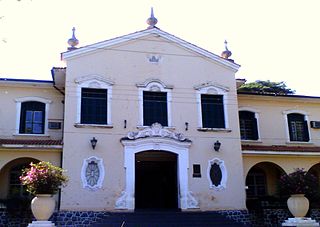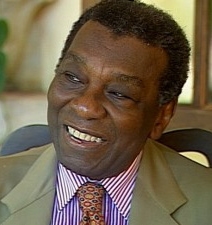Geopolitics is the study of the effects of Earth's geography on politics and international relations. While geopolitics usually refers to countries and relations between them, it may also focus on two other kinds of states: de facto independent states with limited international recognition and; relations between sub-national geopolitical entities, such as the federated states that make up a federation, confederation or a quasi-federal system.

São Paulo is one of the 26 states of the Federative Republic of Brazil and is named after Saint Paul of Tarsus. As the richest Brazilian state and a major industrial complex, often dubbed the "locomotive of Brazil", the state is responsible for 33.9% of the Brazilian GDP. São Paulo also has the second highest Human Development Index (HDI) and GDP per capita, the fourth lowest infant mortality rate, the third highest life expectancy, and the third lowest rate of illiteracy among the federative units of Brazil, being by far, the safest state in the country. The homicide rate is 3.8 per 100 thousand as of 2018, almost 1/4 of the Brazilian rate. São Paulo alone is richer than Argentina, Uruguay, Paraguay and Bolivia combined. If São Paulo were an independent country, its nominal GDP would be ranked among the top 20 in the world. The economy of São Paulo State is the most developed in Brazil.

Ribeirão Preto is a municipality and a metropolitan area located in the northeastern region of São Paulo state, Brazil.

The Federal University of São Carlos is a public research university located in São Carlos, state of São Paulo, Brazil.

Faculdade de Medicina de Ribeirão Preto is a medical school of the University of São Paulo (USP) located in the city of Ribeirão Preto, state of São Paulo, Brazil, founded 1952. It is considered one of the three best medical schools in the country and a premier medical research center.
Folha de S.Paulo, also known as Folha de São Paulo, or simply Folha, is a Brazilian daily newspaper founded in 1921 under the name Folha da Noite and published in São Paulo by the Folha da Manhã company.

Science and technology in Brazil has entered the international arena in recent decades. The central agency for science and technology in Brazil is the Ministry of Science and Technology, which includes the CNPq and Finep. This ministry also has direct supervision over the National Institute for Space Research, the National Institute of Amazonian Research, and the National Institute of Technology (Brazil). The ministry is also responsible for the Secretariat for Computer and Automation Policy, which is the successor of the SEI. The Ministry of Science and Technology, which the Sarney government created in March 1985, was headed initially by a person associated with the nationalist ideologies of the past. Although the new minister was able to raise the budget for the science and technology sector, he remained isolated within the government and had no influence on policy making for the economy.
Marcelo Damy de Sousa Santos was a Brazilian physicist.
José Aristodemo Pinotti was a Brazilian physician, gynecological surgeon, university professor, scientific and educational leader and politician.

The Pontifical Catholic University of São Paulo, locally known as PUC or the Catholic University, is a private and non-profit Catholic university. It is one of the largest and most prestigious Brazilian universities. It is maintained by the Catholic Archdiocese of São Paulo.
Renato Helios Migliorini was a Brazilian physician, biomedical scientist, biochemist and full professor of physiology at the Medical School of Ribeirão Preto of the University of São Paulo.
Antônio Drauzio Varella is a Brazilian doctor, educator, scientist and medical science popularizer in the press and TV, as well as best-selling author. In addition to medicine, Varella is a public commentator on issues such as prison conditions, social welfare, government, literature and his professed atheism and skepticism.
Gilberto De Nucci is a noted Brazilian physician, scientist and university professor in the field of pharmacology.

Unisinos is a Brazilian private Jesuit university founded in 1969. Its main campus is located in Southern Brazil, in the city of São Leopoldo, state of Rio Grande do Sul. Unisinos has more than 30,000 students in its 91 undergraduate programs, 19 academic master's programs, 6 professional master's programs, and 14 PhD programs, with six schools – Polytechnic, Business, Law, Health, Creative Industry, and Humanities.

Fernando Flávio Marques de Almeida was a Brazilian geologist considered to be one of the top Brazilians concerned with the study. Almeida did the central works to understand the South American geology. He is the son of the first Brazilian generation of geologists who did the pioneering papers of the continent's geology. Marques de Almeida is a member of the Brazilian Academy of Sciences.

The Federal Institute of São Paulo, or in full: Federal Institute of Education, Science and Technology of São Paulo is an institution that offers high education and professional education by having a pluricurricular form. It is an multicampi institution, specializing in offering professional and technological education in different areas of knowledge. It was known previously as Federal Center of Technological Education of São Paulo. IFSP is one of the five Federal Colleges in São Paulo, the other ones being ITA, UFSCar, UNIFESP and UFABC.
Fundação Getúlio Vargas is a Brazilian higher education institution and think tank founded on December 20, 1944, with a mission "To stimulate Brazil’s socioeconomic development". Its initial objective was to prepare qualified people to work in public and private administration in Brazil.
The University of the State of Paraná is an institution of higher education administered by the Government of the state of Paraná, with a headquartered in the city of Paranavaí, It has campuses in the cities of Curitiba, Apucarana, Campo Mourão, Paranaguá, Paranavaí, São José dos Pinhais and União da Vitória, created by State Law nº 13.283, on October 25, 2001, changed by State law nº 13.358 on December 21, 2001, State Law nº 15.300 on September 28, 2006 and by State Law nº 17.590 on June 12, 2013. It is affiliated with the Science, Technology and Higher Education's Secretary of State.
Björn Kjerfve is a Swedish-American oceanographer who, as Chancellor since 2014, is leading the challenge of transforming American University of Sharjah (AUS) located in Sharjah, United Arab Emirates (UAE), into a comprehensive research university. Also serving as Professor of Environmental Sciences, Dr. Kjerfve's expertise is in coastal and estuarine physical oceanography. He resigned from his position at the American University of Sharjah in March 2019.











